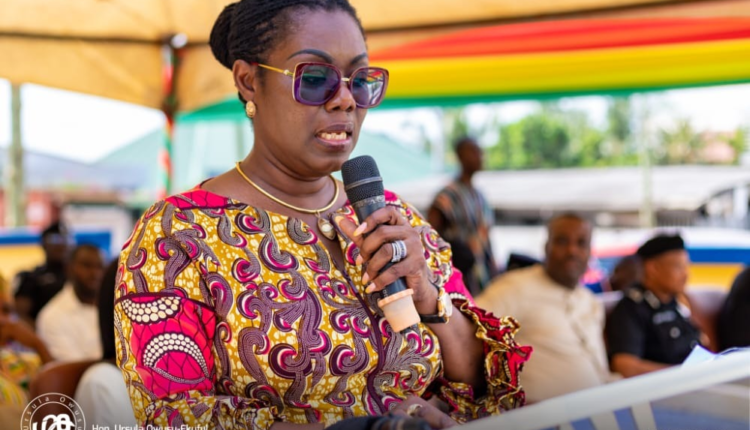The Government of Ghana is working tirelessly with innovative measures to improve and shape the National Information Technology Agency (NITA) with resources and necessary support for international standards, Minister of Communications and Digitalisation (MOCD), Mrs. Ursula Owusu-Ekuful has said.
The Minister made the disclosure at a stakeholder forum to engage and educate ICT industry players on NITA’s regulatory activities and solicit feedback to fine-tune its implementation strategy on Monday 19th December 2022 at Kofi Annan Centre for Excellence (KACE) which was under the theme, ‘Regulating ICT Businesses and Practitioners in Ghana: Opportunities and Challenges’.
“The Ministry is putting in place measures to build NITA’s capacity, provide them with the needed resources and executive support to ensure it provides the much-needed cutting edge and international best practice regulatory services to the sector. The focus is for NITA not to be a profit-oriented or heavy handed regulator but one that enables, promotes, and ensures a vibrant and competitive ICT ecosystem with opportunities for businesses and citizens” she said.
She indicated that the focus to shape NITA into an international operational standard is necessitated on, protection of consumer interest within the ecosystem, monitoring compliance with contractual obligation to the government, users, and other legal and regulatory requirement and establishing technical, safety and quality standards and monitoring their compliance.
She added, “the regulation will cut across the ICT industry from service providers, practitioners, ICT infrastructure and its operations, eCommerce, public sector ICT and Public Key Infrastructure (PKI). This means NITA will be working on accreditation of service providers and practitioners alike and they will be doing this in close collaboration with agencies like the Cyber Security Authority, Data Protection Commission, National Communications Authority and other government regulators.
“We will build regulatory systems and platforms to make regulations more efficient, transparent, and practical and as much as possible, eliminate multiple regulatory burdens on businesses and practitioners.”
Mandate
Explaining the importance of other innovative ideas implemented towards the country’s digital agenda, the Minister said, her Ministry spearheaded such moves to bring services and technological systems closer to the public.
“Ministry was mandated to lead and champion the Government’s Digital Agenda through the implementation of digital initiatives to bring services closer to the people. We can all attest to the embossment of digital addresses at our houses and business, implementation of interoperability platform that has enabled the digital financing sector and roped in more to bank using the mobile money platform, issuance of Ghana card and its integration with SSNIT, Bank Accounts, SIMs, and other critical services where verification and authentication are required, the Ghana.Gov platform for access and payment of public services, etc. The private sector I must say has also stepped up to the plate and effectively matched these developments with innovation and technology in their service delivery as well and all these are fast tracking our development.
“The benefits of these initiatives to the citizens cannot be quantified. The ICT sector therefore requires a strong regulator ensuring that businesses thrive and consumers receive value for money on products, solutions and services rendered by the ICT industry. The Ministry realized there was a gap in the implementation of NITA’s regulatory mandate, and directed the leadership of NITA to refocus its attention on its core mandate of regulating the ICT space whilst the operational aspect of its activities is handled by a technical partner.”
Systems
She explained and detailed government plans on making regulatory systems transparent, as well as a smooth system to enable business operations survive for growth and development.
“We will build regulatory systems and platforms to make regulations more efficient, transparent, and practical and as much as possible, eliminate multiple regulatory burdens on businesses and practitioners.
“As the sector grows, it comes with its associated risk and hazards that requires proper management to prevent loss of resources for citizens, businesses, and the economy at large. It is therefore imperative that Government partners with the private sector to ensure that systems are standardized to withstand attacks.”
NITA to do more
Channeling more energy on the operations of NITA from 2023, she urged its leaders to strategically engage technology experts through workshops, webinars, and training programs among others.
“NITA to tap into the rich skillset of the industry by forming working groups to periodically review standards and regulations and provide some advisory and valuable inputs on government policies. I will expect to see such partnership churning out webinars, workshops, training programs on technology in 2023.
“NITA partnering with academia and industry is the surest way of providing tailored solutions that address our peculiar problems as a nation and saving the nation of much needed forex and export of some of the Ghanaian made solutions” she noted.
In addition, she said the Ministry as part of its effort to position the ICT sector well is currently conducting a gap analysis of all laws and regulations to determine whether they are still relevant and adequate for the maturity of the ecosystem in the ensuing years.
“We will then work to develop additional laws and regulations if the study identifies any such gaps. The Ministry is consulting with stakeholders to finalize the Digital Economy Policy and strategy for Ghana. The Digital Economy Policy is the successor to the ICT4AD policy and will be expected to move Ghana’s digital agenda to the next level and drive all the needed initiatives and programs to accelerate Ghana’s development.
“The era of a digitalized economy has come to stay. We will have to organize ourselves as a community to ensure a stable and reliable ecosystem with enough opportunities for all. The ecosystem should grow at a sustainable rate and contribute its quota to the total transformation of our economy” she detailed.


Comments are closed.